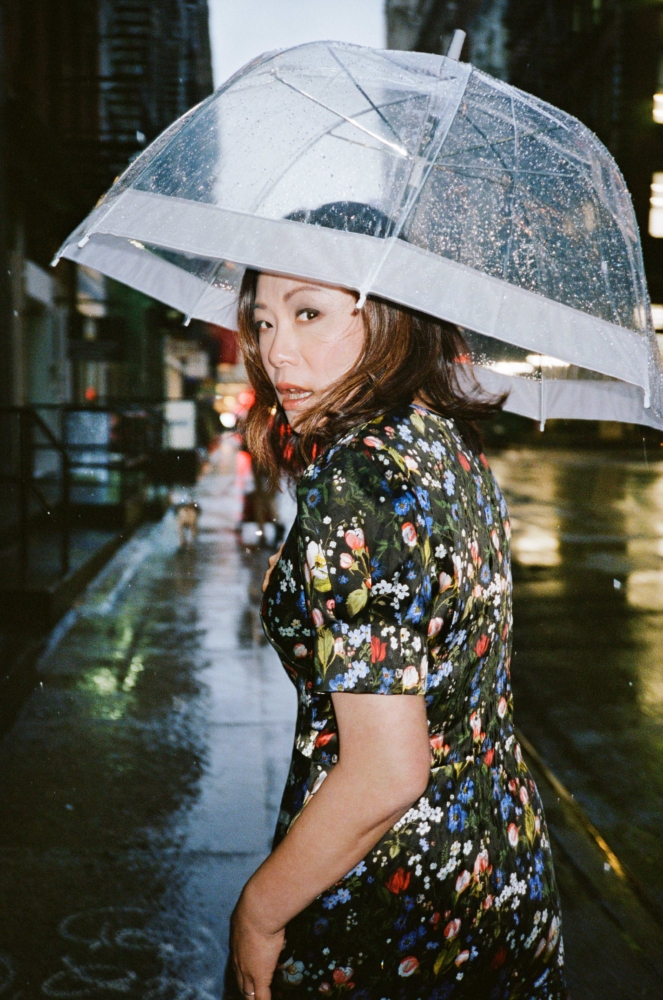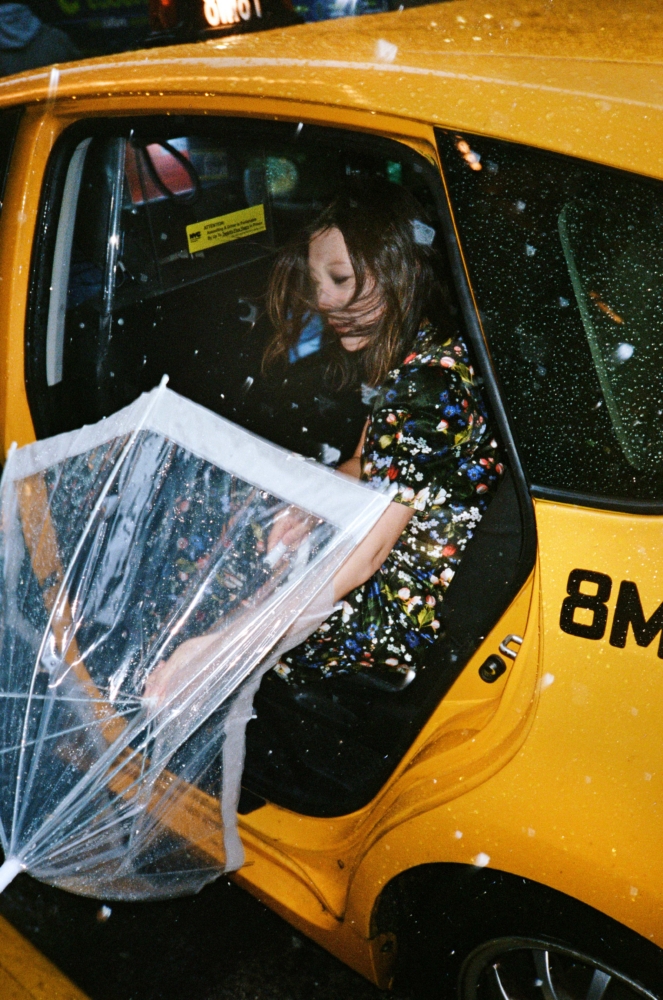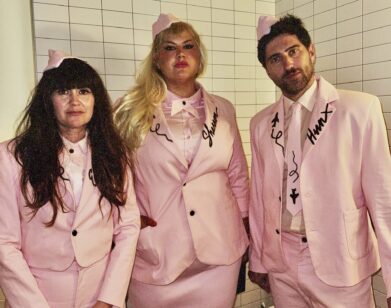Sandi Tan’s Long Strange Trip Is Just Beginning

Meeting Sandi Tan is what I imagine meeting a detective or an investigative journalist just off a big break must be like — wired and relieved, but still churning over the essential details of their mystery. The filmmaker and writer was doing just this, with an energy that was tinged with self-doubt and assertiveness, when I met her at a sterile Soho hotel this past November. In Tan’s case, the mystery she had been sifting through for the last 25 years was one of her own making — well, mostly. At the age of 19, the Singapore-born director, along with her friends Sophia Siddique and Jasmine Ng, set out to complete a feature-length film, a scrappy and sprawling road-film titled Shirkers. Made with the help of friends and family, and filmed in a grueling production spring, the 70 reels of film that Tan shot were considered to be some of the most — if not singularly — important pieces of independent cinema to be made in Singapore in the 1990s. And then, in a noir-like twist, those reels vanished for two decades.
What came of Tan’s interrupted debut is another debut, Shirkers, a documentary on a film that never was. After its premiere at the Sundance Film Festival this year, Shirkers quickly became a Netflix breakout, in part because no one has made a documentary quite like it. It’s an Orson Welles-like visual essay, but for the Bikini Kill generation — part tribute to cinema, part whodunnit, part study of teenage friendships that follows the trio into adulthood, where the thorniness of their seemingly-euphoric collaboration is revealed in full. But it’s the notion of mystery that Tan circles relentlessly throughout her film. In her pursuit, she moved far beyond the perimeter of the missing reels and the mentor-like figure who absconded with them, opting instead to understand how three teenagers, living in a region mostly isolated from the culture they worshiped (French New Wave, punk, Twin Peaks, zines), could make a feature film. In the film, Tan asks, How does anyone endure the self-doubt of making something new and original? And if that inspiration has been lost, or tampered with, how does one find it again?
Talking to Tan, it’s clear she did find it after a grueling journey. The heavy presence of her tale, and the 25 years of processing it all, has left her pleasantly irritated by its success. “I’m really suspended in amber because of this stupid Shirkers thing,” Tan told me shortly after we began talking. She has plans to develop both TV and film projects in the coming year, though she doesn’t want to jinx anything by saying just what the projects are. Following our conversation, she would first attend the Gotham Awards, where Shirkers would narrowly lose to Hale County This Morning, This Evening, before flying to her hometown of Los Angeles to screen her film at the Los Angeles County Museum of Art. New enigmas await the filmmaker, just now hitting her stride — like mingling at awards shows.
———
PEMBERTON: So, are you any good at the mingling part?
TAN: It depends. If there are people there that I know and like, it’s okay. I’m not so great with people who aren’t invited and there to scrounge for food.
PEMBERTON: That sounds like something I would do, unfortunately.
TAN: But that’s fine because you’re a young, attractive person. Usually, they’re not. They have walkers. And remember, this is in L.A., so they’ll pretend to be old people who are serious viewers of documentaries or who might vote for your film for awards season. Really, they’re just there for the food. There are famous scroungers like that. Once, a friend of mine saw an old couple come in and just grab a pizza on the table and put it in their bag. They were bad-mouthing the film, bad-mouthing everything. And they had to sit through the entire film just to go to the dinner! Apparently, they’re notorious in L.A. They keep going to all these screenings doing the same thing. Another friend of mine deliberately spilled red wine on the woman a few years ago because she’s so annoying and she’s so obviously fake.
PEMBERTON: If you’re gonna steal food from the buffet at least be complimentary.
TAN: My friend spilled wine on this woman because of an argument — and because this is L.A. — stemming from acting class they were both in like 30 years ago. She couldn’t make it as an actress, so she’s now some professional L.A. scrounger, which happens a lot, apparently.
PEMBERTON: I’m sure some art-world variation of this occurs in New York.
TAN: I’m always fantasizing about moving back here.
PEMBERTON: You spent 10 years here, made it out, but you want to come back?
TAN: Yeah, all of the interesting people are here. My friends are doing interesting work here. The people I admire are here. And the writing is still better here because nobody reads in L.A. We have the highest number of book buyers here because there’s so much space to keep your books.
PEMBERTON: What’s an interesting place in New York that can’t be replicated in Los Angeles?
TAN: Metrograph. I love it. I guest programmed for them a few weeks ago.
PEMBERTON: What did you select?
TAN: Lovers on the Bridge by Leos Carax. They had to fly the film in because of me. [Laughs.] It was a 35-millimeter print from Paris that hasn’t been seen since its release. They were only allowed to show it three times because it was such a rare print. It was sold out! Everybody came because that’s New York on a cold rainy night. Ed Lachman was there. Brady Corbett was there. Sean Price Williams, too. It was so cool. When I was there, I was like, Fuck! This is my kinda town. Why am I exiled in Los Angeles?

PEMBERTON: It’s funny that you think of it as exile, when so many New Yorkers think of Los Angeles as as escape. Is this conversation a trope?
TAN: It’s false, you know. If you get depressed here, you go to a movie or you go to a park. You go to a museum. You see things, and you get inspired. You have friends, and it’s so easy to see them. Everyone is just a subway ride away. Out there, you see people once, and it’s just impossible to see them again, or like they always say, it’s like getting a second date, but with your friends. Even getting people to the movies is hard because nobody goes to the movies in Los Angeles — the capital of movies. When you have AFI [the American Film Institute,] where movie tickets are free, nobody goes. They’re just going to wait for the screener.
PEMBERTON: Have you enjoyed doing press for Shirkers, considering you were once a film critic yourself?
TAN: Is your recorder on?
PEMBERTON: Yes, it is.
TAN: I’m just rambling, rambling, and being completely casual.
PEMBERTON: No, rambling interviews are the best.
TAN: Okay, good. Anything other than those fake little stilted answers. I wasn’t a great film critic, but the standards were really low in Singapore. I was the kid critic. And my main readers were 13 and 14-year-olds. I got a lot of fan mail from boys wanting to ask me out. It was very Rushmore because I was in my early 20s. And I was writing about movies that people over there didn’t normally write about, so I was getting people to see Wong Kar-Wai or Peter Jackson. I just thought he was the greatest. I made The Frighteners a huge hit over there because it’s a ghost movie, so you could sell it as a commercial film. [Editor’s Note: The Frighteners was mostly a box office disappointment.]
Then, I began slamming bad Schwarzenegger films, and the production companies started threatening my editor at the paper to stop giving the paper exclusives with these actors. It was really fucked up. My editors were so concerned, they would ask, “Can you tone down it down a little?” Sometimes because you wouldn’t cooperate, these companies would make up quotes with your name on it. United International Pictures made up a quote for this film called Junior, with Arnold Schwarzenegger and Emma Thompson, where Arnold is pregnant or something.
PEMBERTON: Yes, Schwarzenegger has a baby.
TAN: It was an atrocious film, but they actually used my name on a quote for an advertisement in our paper: “Arnie and Emma Thompson have great chemistry!” Exclamation point. I would never say “Arnie,” first of all! It was appalling. And so scary. I knew it was time to leave. That was the point when I decided to go to film school.
PEMBERTON: While you were on your two-decade journey to make Shirkers, you wrote a novel, some screenplays, film reviews, of course. How did you classify yourself to people during your creative interregnum?
TAN: In Los Angeles, everybody’s an actress, or everybody’s a screenwriter — but they’re really a waiter or a dog walker, right?
PEMBERTON: So what was your lie, then?
TAN: I’m a filmmaker, I guess. I would always have an “I guess,” or some kind of “Many, many years ago I made some things” attached to this, though. I guess I’m a filmmaker, I guess.
PEMBERTON: And now?
TAN: Right now, I’m being interviewed, so I’m an interviewee. I really just can’t wait to make up for lost time, you know with all these things that I’m trying to do.
PEMBERTON: It’s strange to think, when you’ve just made a film that’s nominated for a Gotham Award and an Independent Spirit Award, that’d there’d be any doubt.
TAN: No, there’s no doubt, it’s just … There’s no doubt at all.
PEMBERTON: How long did the idea of making a documentary gestate in your mind before you moved forward on it?
TAN: Once the boxes of film started arriving. Chronologically, they began to appear in my life starting in 2011. George’s wife began shipping them to me, but they sat in my living room for, like, three years before I had the courage to kind of open them up.
PEMBERTON: What was it like having them just—
TAN: Stacked in my living room like a vertical coffin?
PEMBERTON: Yes, that.
TAN: They were just like a ghostly presence, an everyday reminder of unfinished business I had to deal with. It was so toxic because I knew that as soon as I did, I would have to also engage these other characters, and it wasn’t just going to be me. The prospect of reopening a wound, really my own psychic wound —
[TAN stands up after a loud noise in the hotel lounge interrupts us. She gently asks three hotel servers making non-work-related noise to be quiet for the sake of our interview. She also attempts to close a set of double-doors in the hallway. They are locked open.]
TAN: Excuse me.
PEMBERTON: We can move if that’s better.
TAN: No, we should be fine. Anyway, I knew I wanted to do something with the footage because it looked good, even though I didn’t actually know if the footage was going to look any good. I had to compare my memory of it to my fantasy of it. Luckily, my memory and fantasy and the reality was all the same. It was exactly as I remembered it. I wasn’t insane, which is great.
PEMBERTON: What is it like for you to look back at the version of yourself that wasn’t a filmmaker, wasn’t anything defined in the world, beyond a girl with raw creativity and ambition? To me, Shirkers is the embodiment of an experience so many creative folk could never put words to.
TAN: It’s a curse and a gift. The footage from the film lives its best life in this form. It’s a better story than if we had just pieced together the original and put it out. It would have been just an oddity, a strange little artifact made by these crazy teenagers. It could’ve been so easily dismissed, whereas telling this story, it becomes so universal to so many people. People have watched it and have come to me weeping like it’s about them, too. So many people have this kind of thing happen to them, where they either had a crisis of confidence or have had something taken away from them. Everyone is trying to find the courage to open up that wound and pursue it and finish it. I feel gratified to be able to share a personal story that allows other people to take on some of this burden, the emotional burden of Shirkers, for me. I don’t have to carry it myself, which is amazing. I feel so much lighter. That’s been my healing process, in a strange way.
PEMBERTON: You’re one of those rare cases of someone making it through to the other end of the strange journey of making something.
TAN: On the other end of this, I feel like got my wings back, or something. We rediscovered what it was like to have been superheroes because our superhero was our 18-year-old self. A lot of people lose that, and you forget it. Having made this film and having watched what we did — going through the whole thought process — was to remember what it felt like to be young and brave and just boundlessly optimistic.






